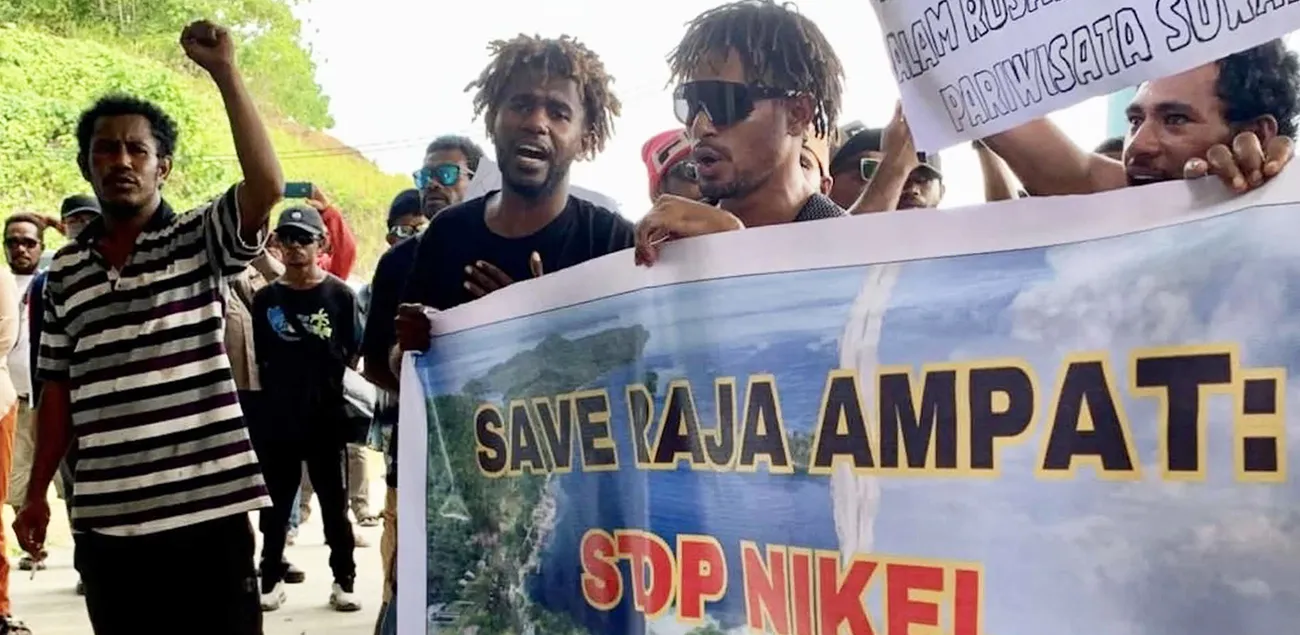
The Indonesian government has revoked the mining permits of four nickel companies in the ecologically fragile Raja Ampat archipelago, a UNESCO Global Geopark renowned for its marine biodiversity. The decision, announced by Energy and Mineral Resources Minister Bahlil Lahadalia, follows a high-profile public campaign by Greenpeace Indonesia that exposed significant environmental damage from mining activities. While hailed as a victory for conservation, the move leaves the region’s largest nickel operator untouched and does little to alter Indonesia’s aggressive expansion as the world’s dominant nickel producer.
Environmental Campaign Forces Government Action
The government’s decision was a direct response to a Greenpeace Indonesia investigation that documented the destruction of over 500 hectares of forest on the islands of Gag, Kawe, and Manuran. The campaign, which included a protest at the Indonesia Critical Minerals conference in Jakarta, highlighted how soil runoff from cleared land was creating turbidity and sedimentation in coastal waters, posing a direct threat to Raja Ampat’s delicate coral reefs. The region is home to approximately 75% of the world’s known coral species and over 1,600 species of fish.
Under pressure, President Prabowo Subianto’s administration moved to cancel the permits of four privately owned companies: PT Kawei Sejahtera Mining, PT Mulia Raymond Perkasa, PT Anugerah Surya Pratama, and PT Nurham. Announcing the revocations, Minister Bahlil stated the action was necessary to protect the area’s unique ecosystem, marine biodiversity, and world-class tourism potential.
A Limited Crackdown with Major Exemptions
Despite the government’s action, environmental groups remain skeptical, pointing out that the revocations are not a comprehensive solution. The permit for PT Gag Nikel, a subsidiary of the state-owned mining company Aneka Tambang and the only major producer in the area, was not revoked. Officials justified this by stating that its operations on Gag Island lie outside the designated UNESCO geopark boundaries.
Furthermore, Greenpeace has challenged the government’s initial assertion that the four shuttered companies were not yet active. Kiki Taufik, Head of Forests Campaign at Greenpeace Indonesia, stated that several of the companies had already begun land-clearing activities. The organization has demanded that the former permit holders be held accountable for environmental restoration.
The Bigger Picture: Indonesia’s Unchecked Nickel Expansion
The targeted action in Raja Ampat represents a minor course correction within Indonesia’s broader strategy of overwhelming the global nickel market. The country now supplies well over half of the world’s nickel, a critical component in electric vehicle (EV) batteries and stainless steel. This expansion has been swift and transformative. According to government data, the number of nickel smelters grew from just two before the first export ban in 2014 to 13 by 2020, with a target of reaching 30 by 2023. This rapid industrialization has come at a significant environmental cost, with widespread deforestation and pollution. While the government addresses a localized environmental crisis in a high-profile tourist destination, its national policy continues to prioritize large-scale production to feed the global EV supply chain.
Company Background and Market Context
The Indonesian Ministry of Energy and Mineral Resources (ESDM) is the regulatory body responsible for issuing mining permits and overseeing compliance. It operates under a dual mandate to attract investment and drive economic growth while managing the environmental impacts of the country’s vast resource extraction industries.
Greenpeace Indonesia is the local chapter of the international environmental organization. It has been increasingly active in monitoring Indonesia’s mining sector, using public campaigns and investigative work to pressure the government and corporations on issues of deforestation and pollution.
PT Gag Nikel is a subsidiary of PT Aneka Tambang (Antam), a diversified, state-owned Indonesian mining company. Antam is a key player in the country’s strategic minerals sector, with interests in nickel, gold, and bauxite.
Nickel Market Overview
Nickel’s role is central to the global energy transition, but its supply chain is fraught with environmental and social challenges. Indonesia’s strategy has successfully lowered global nickel prices, putting pressure on higher-cost producers in other countries. However, the environmental footprint of its nickel, largely produced using coal-fired power and entailing significant deforestation, is drawing increased scrutiny from downstream consumers, including major automakers who have pledged to source materials responsibly. The incident in Raja Ampat underscores the growing conflict between the world’s demand for “green” technology and the environmental cost of producing the materials required for it.



